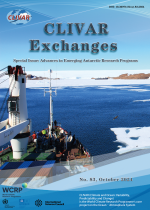【ONLINE】2020 EGU Session: Sustained Ocean Observing and Paths Toward Improved Understanding and Modelling of Climate
Submitted by Qian Zhao on Wed, 2019-12-04 01:29
Friday, May 8, 2020
Event City:
Vienna
Austria
Event Attendance:
Simon Josey, Rena Czeschel, Maria Valdivieso, Robert Weller
Event Description:
The EGU is officially announcing the cancellation of the physical EGU General Assembly 2020 in Vienna, Austria, and decided to host EGU2020: Sharing Geoscience Online (#shareEGU20), a week-long series of online activities held during the first week of May that support our community by fostering scientific communication.
EGU 2020 session OS1.6/CL2.15
Sustained Ocean Observing and Paths Toward Improved Understanding and Modelling of Climate
Sustained observations at sea are being made within a wide variety of programmes and are leading to significant advances in our ability to understand and model climate. Further efforts to make sustained observations at the sea surface and through the water column are planned under the Global Climate Observing System (GCOS), the Global Ocean Observing System (GOOS), and the UN Decade for Ocean Research for Sustainable Development. This session will explore ongoing and planned sustained ocean observing efforts and illuminate their roles in improving understanding of climate. At the same time it seeks to probe the interfaces between observing, modelling, and the development of products. Various sustained observations are being used to obtain new insights into climate variability and to guide the development of products. For example, air-sea flux moorings are being maintained at select sites to assess models and air-sea flux fields. They also form a valuable tool to calibrate and validate remote sensing of the ocean. Deep temperature and salinity measurements are being made at time series moorings and will be made by deep ARGO floats. Moored arrays have been established to measure meridional transports. Such sustained observations provide the means to investigate model biases and errors and motivate improvements to models. This session seeks to encourage the growth of linkages between sustained ocean observing and climate modeling. In particular, we ask for contributions both on sustained observation-based studies of climate variability and present or future improved collaborations between observing and modelling.













